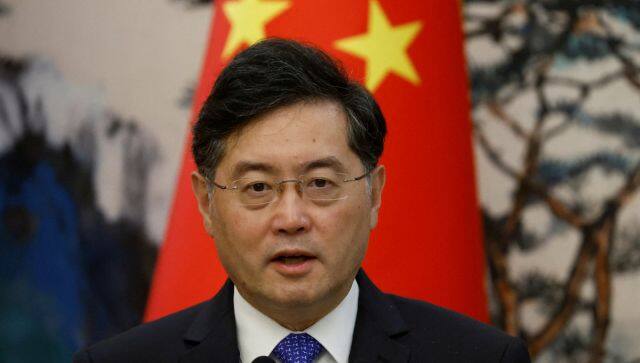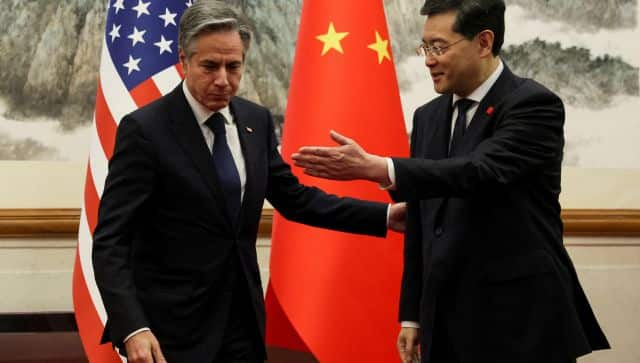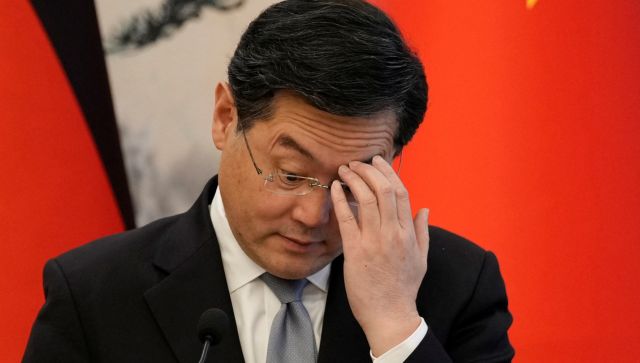China on Tuesday (25 July) replaced its foreign minister Qin Gang with his predecessor, top diplomat Wang Yi. The development came amid speculations swirling around Qin’s month-long absence from public view. A close aide of President Xi Jinping, Qin was last spotted in public on 25 June, when he held talks with his counterparts from Russia, Vietnam and Sri Lanka in Beijing. Qin’s whereabouts remain a mystery, with Beijing being tight-lipped about sharing any information about his disappearance and eventual removal. Let’s take a look at the sudden ascent and fall of China’s ‘rising star’. The unexpected rise of Qin Gang Born in the northern city of Tianjin in 1966, Qin spent the majority of his career in diplomatic service. According to Reuters, he studied International Politics at the prestigious University of International Relations in Beijing. After graduation, he entered diplomatic service. He joined the ministry of foreign affairs in 1992, serving in various capacities at China’s embassy in the United Kingdom from 1995-2005, reported Reuters. He came back to Beijing in 2005. Qin was appointed as the foreign ministry spokesman twice, between 2006 and 2014. As a spokesperson, he was known for his “wolf warrior” diplomacy. Wolf warriors are those Chinese diplomats who aggressively defend Beijing’s assertive foreign policy. The Diplomat magazine described Qin as “one of the first Chinese foreign ministry celebrities” for his biting remarks. According to an instance cited by CNA, when asked about US rock band Guns N’ Roses’ album ‘Chinese Democracy’, he had said: “Not many people are fond of this kind of music because it’s too loud and noisy. Besides, you are a mature adult, aren’t you?” [caption id=“attachment_12917612” align=“alignnone” width=“640”] China’s Qin Gang came to be known for his ‘wolf warrior’ diplomacy. Reuters File Photo[/caption] Analysts believe Qin’s stars started rising when he was the foreign ministry’s chief protocol officer between 2014 and 2018, noted CNA. In this role, he arranged Xi’s interactions with foreign leaders, which is believed to have provided him the opportunity to get close to the president. Considered Xi’s protégé, Qin was promoted to vice minister of foreign affairs in 2018. He replaced Cui Tiankai in July 2021 as China’s ambassador to the United States. Although Qin came to recognised for his criticism of the West, he also expressed willingness to work with the US, following a dip in relations between the two countries. As he arrived in Washington as ambassador, he declared that the relations between China and the US held “great opportunities and potential”, reported Reuters. “Those of us in the press corps who have known Qin for years have seen a deft, wily player … who knows how to bend with the prevailing wind from Beijing,” Melinda Liu wrote in a profile for Foreign Policy magazine. Qin Gang’s fall from grace Qin’s elevation to the Chinese Communist Party’s powerful Central Committee last November had put him in a prime position to become the next foreign minister. His ascension as the foreign minister last December, at 57, made him one of the youngest officials in the country to hold that position. As per Reuters, analysts viewed his taking over the post as a likely step by China to stabilise ties with the US, which are at their lowest. “He’s (Qin) been promoted because, like others, he is very faithful to Xi Jinping,” Jeffrey Moon, president of China Moon Strategies and a former US consul general in Chengdu, told South China Morning Post (SCMP) last year. “But on relations with the US, he has not moved things very far.” Qin was made a state councillor in March, which, according to CNA, is a senior position in the state bureaucracy. In late June, things started going south for this rising star. As America and China kicked off measures to reduce tensions, Qin met US secretary of state Antony Blinken in Beijing last month, just a week before the now-former foreign minister’s disappearance. [caption id=“attachment_12917572” align=“alignnone” width=“640”]
China’s Qin Gang came to be known for his ‘wolf warrior’ diplomacy. Reuters File Photo[/caption] Analysts believe Qin’s stars started rising when he was the foreign ministry’s chief protocol officer between 2014 and 2018, noted CNA. In this role, he arranged Xi’s interactions with foreign leaders, which is believed to have provided him the opportunity to get close to the president. Considered Xi’s protégé, Qin was promoted to vice minister of foreign affairs in 2018. He replaced Cui Tiankai in July 2021 as China’s ambassador to the United States. Although Qin came to recognised for his criticism of the West, he also expressed willingness to work with the US, following a dip in relations between the two countries. As he arrived in Washington as ambassador, he declared that the relations between China and the US held “great opportunities and potential”, reported Reuters. “Those of us in the press corps who have known Qin for years have seen a deft, wily player … who knows how to bend with the prevailing wind from Beijing,” Melinda Liu wrote in a profile for Foreign Policy magazine. Qin Gang’s fall from grace Qin’s elevation to the Chinese Communist Party’s powerful Central Committee last November had put him in a prime position to become the next foreign minister. His ascension as the foreign minister last December, at 57, made him one of the youngest officials in the country to hold that position. As per Reuters, analysts viewed his taking over the post as a likely step by China to stabilise ties with the US, which are at their lowest. “He’s (Qin) been promoted because, like others, he is very faithful to Xi Jinping,” Jeffrey Moon, president of China Moon Strategies and a former US consul general in Chengdu, told South China Morning Post (SCMP) last year. “But on relations with the US, he has not moved things very far.” Qin was made a state councillor in March, which, according to CNA, is a senior position in the state bureaucracy. In late June, things started going south for this rising star. As America and China kicked off measures to reduce tensions, Qin met US secretary of state Antony Blinken in Beijing last month, just a week before the now-former foreign minister’s disappearance. [caption id=“attachment_12917572” align=“alignnone” width=“640”] US secretary of state Antony Blinken met China’s foreign minister Qin Gang in Beijing on 18 June. Reuters File Photo[/caption] On 11 July, China’s foreign ministry said Qin could not attend a meeting in Indonesia for “health reasons”, reported Reuters. It did not share any more information.
Wang, China’s foreign policy adviser
, filled in for Qin in the meanwhile. Speculations about Qin’s disappearance have continued to surface, with some attributing it to an affair with a female television presenter and a child born out of wedlock in the US. ALSO READ:
Ill-health or love affair? Why has Qin Gang been removed as Chinese foreign minister?
Due to the opaqueness of China’s political system, experts say it cannot be determined which of the reasons might be behind his fall from grace. Wu Qiang, an independent academic and political commentator in China, told Deutsche Welle (DW) last week that the “abrupt disappearance of Qin is highly troublesome since it indicates that Beijing may be moving closer to a mystical and unpredictable form of autocratic leadership”. “The whole situation … underlines that the CCP (Chinese Communist Party) system might not be as streamlined and stable as one might assume,” Moritz Rudolf from Yale’s Paul Tsai China Center said, as per CNA. Qin’s sudden elevation may have also ruffled feathers in Beijing. “The quick rise of Qin Gang might have created some resentment among other senior people within the Chinese Ministry of Foreign Affairs”, Rudolf added. Analysts say Xi, who was behind Qin’s ascension, is unlikely to share the blame for his aide’s fall. “Whatever Qin’s ultimate sin, it will be framed as a betrayal of Xi rather than Xi’s misjudgment in appointing Qin in the first place,” Jude Blanchette, Freeman chair in China studies at the Center for Strategic and International Studies (CSIS), told The Washington Post. Qin’s political future now hangs in the balance, as references to him are already being taken down from the Foreign Ministry website. If he will retain his position as state councillor and on the CCP’s Central Committee remains to be seen. With inputs from agencies
US secretary of state Antony Blinken met China’s foreign minister Qin Gang in Beijing on 18 June. Reuters File Photo[/caption] On 11 July, China’s foreign ministry said Qin could not attend a meeting in Indonesia for “health reasons”, reported Reuters. It did not share any more information.
Wang, China’s foreign policy adviser
, filled in for Qin in the meanwhile. Speculations about Qin’s disappearance have continued to surface, with some attributing it to an affair with a female television presenter and a child born out of wedlock in the US. ALSO READ:
Ill-health or love affair? Why has Qin Gang been removed as Chinese foreign minister?
Due to the opaqueness of China’s political system, experts say it cannot be determined which of the reasons might be behind his fall from grace. Wu Qiang, an independent academic and political commentator in China, told Deutsche Welle (DW) last week that the “abrupt disappearance of Qin is highly troublesome since it indicates that Beijing may be moving closer to a mystical and unpredictable form of autocratic leadership”. “The whole situation … underlines that the CCP (Chinese Communist Party) system might not be as streamlined and stable as one might assume,” Moritz Rudolf from Yale’s Paul Tsai China Center said, as per CNA. Qin’s sudden elevation may have also ruffled feathers in Beijing. “The quick rise of Qin Gang might have created some resentment among other senior people within the Chinese Ministry of Foreign Affairs”, Rudolf added. Analysts say Xi, who was behind Qin’s ascension, is unlikely to share the blame for his aide’s fall. “Whatever Qin’s ultimate sin, it will be framed as a betrayal of Xi rather than Xi’s misjudgment in appointing Qin in the first place,” Jude Blanchette, Freeman chair in China studies at the Center for Strategic and International Studies (CSIS), told The Washington Post. Qin’s political future now hangs in the balance, as references to him are already being taken down from the Foreign Ministry website. If he will retain his position as state councillor and on the CCP’s Central Committee remains to be seen. With inputs from agencies
Qin Gang: The meteoric rise and quick fall of China’s foreign minister
FP Explainers
• July 26, 2023, 14:04:11 IST
Qin Gang lost his job as Chinese foreign minister just seven months after taking over the post. He has been missing from public view since 25 June. Just like his unexpected rise, Qin – President Xi Jinping’s acolyte – is now seeing an abrupt fall from grace
Advertisement
)
End of Article